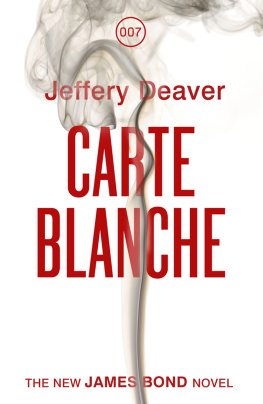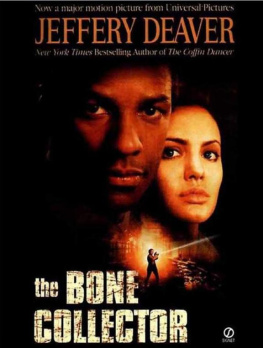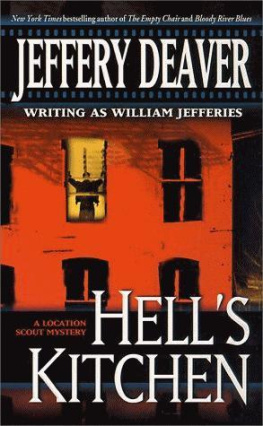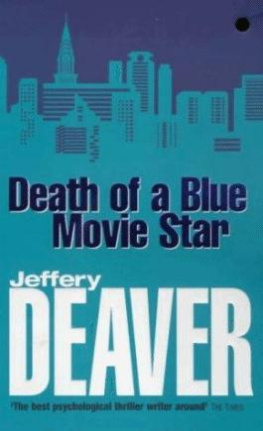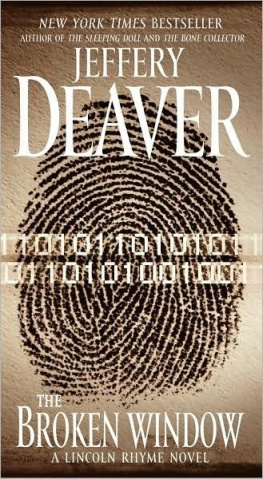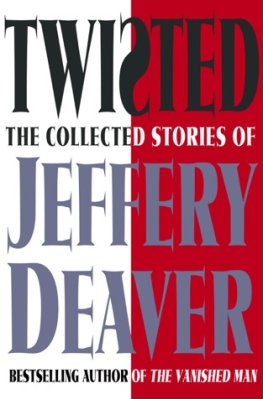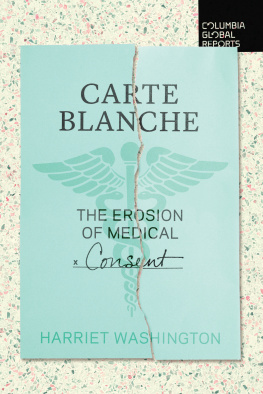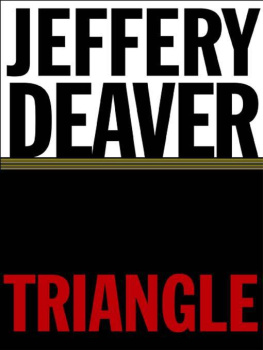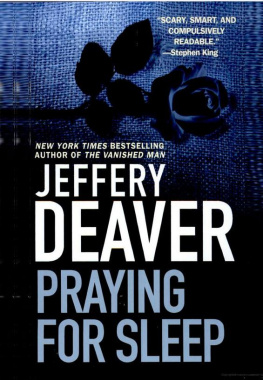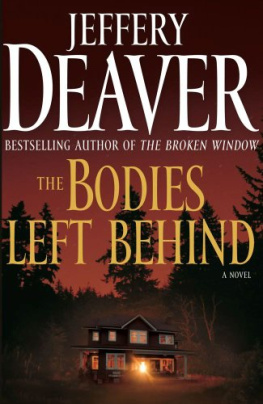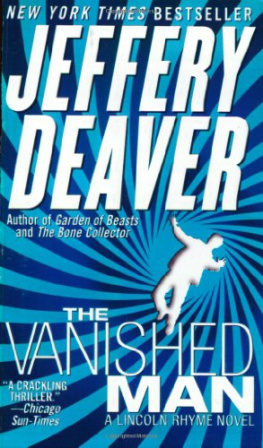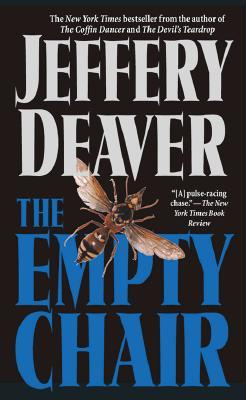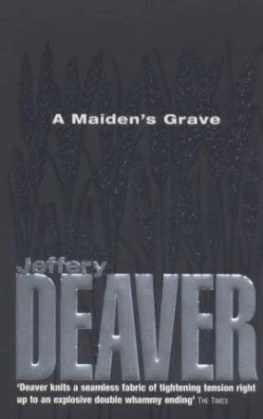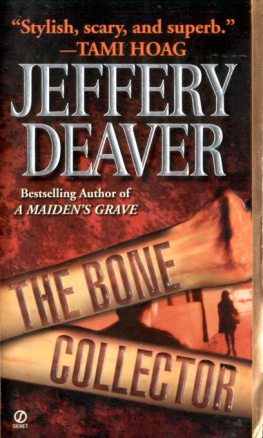Jeffery Deaver - Carte Blanche
Here you can read online Jeffery Deaver - Carte Blanche full text of the book (entire story) in english for free. Download pdf and epub, get meaning, cover and reviews about this ebook. year: 2011, publisher: Simon & Schuster, genre: Detective and thriller. Description of the work, (preface) as well as reviews are available. Best literature library LitArk.com created for fans of good reading and offers a wide selection of genres:
Romance novel
Science fiction
Adventure
Detective
Science
History
Home and family
Prose
Art
Politics
Computer
Non-fiction
Religion
Business
Children
Humor
Choose a favorite category and find really read worthwhile books. Enjoy immersion in the world of imagination, feel the emotions of the characters or learn something new for yourself, make an fascinating discovery.
- Book:Carte Blanche
- Author:
- Publisher:Simon & Schuster
- Genre:
- Year:2011
- Rating:4 / 5
- Favourites:Add to favourites
- Your mark:
- 80
- 1
- 2
- 3
- 4
- 5
Carte Blanche: summary, description and annotation
We offer to read an annotation, description, summary or preface (depends on what the author of the book "Carte Blanche" wrote himself). If you haven't found the necessary information about the book — write in the comments, we will try to find it.
Carte Blanche — read online for free the complete book (whole text) full work
Below is the text of the book, divided by pages. System saving the place of the last page read, allows you to conveniently read the book "Carte Blanche" online for free, without having to search again every time where you left off. Put a bookmark, and you can go to the page where you finished reading at any time.
Font size:
Interval:
Bookmark:

Jeffery Deaver
CARTE BLANCHE
A JAMES BOND NOVEL


www.hodder.co.uk
First published in Great Britain in 2011 by Hodder & Stoughton
An Hachette UK company
Copyright Ian Fleming Publications Limited 2011
James Bond and 007 are trademarks of Danjaq, LLC, used under licence by Ian Fleming Publications Ltd.
The right of Jeffery Deaver to be identified as the Author of the Work has been asserted by him in accordance with the Copyright, Designs and Patents Act 1988.
All rights reserved. No part of this publication may be reproduced, stored in a retrieval system, or transmitted, in any form or by any means without the prior written permission of the publisher, nor be otherwise circulated in any form of binding or cover other than that in which it is published and without a similar condition being imposed on the subsequent purchaser.
All characters in this publication are fictitious and any resemblance to real persons, living or dead is purely coincidental.
A CIP catalogue record for this title is available from the British Library
Ebook ISBN 978 1 444 71644 3
Hardback ISBN 978 1 444 71647 4
Trade paperback ISBN 978 1 444 71648 1
Hodder & Stoughton Ltd
338 Euston Road
London NW1 3BH
www.hodder.co.uk
To the man who taught us
we could still believe in heroes,
Ian Fleming
This is a work of fiction. However, with a few exceptions, the organisations referred to are real. The world of intelligence, counter-intelligence and espionage is one of acronyms and shorthand. Since the alphabet soup of security agencies can be a bit daunting, I thought a glossary might prove helpful. It appears at the end of the book.
J.D.
What is needed is a new organisation to co-ordinate, inspire, control, and assist the nationals of the oppressed countries... We need absolute secrecy, a certain fanatical enthusiasm, willingness to work with people of different nationalities and complete political reliability. The organisation should, in my view, be entirely independent of the War Office machinery.
Hugh Dalton, Minister of Economic Warfare, describing the formation of Britains Special Operations Executive espionage and sabotage group at the outbreak of the Second World War.
His hand on the dead-man throttle, the driver of the Serbian Rail diesel felt the thrill he always did on this particular stretch of railway, heading north from Belgrade and approaching Novi Sad.
This was the route of the famed Arlberg Orient Express, which ran from Greece through Belgrade and points north from the 1930s until the 1960s. Of course, he was not piloting a glistening Pacific 231 steam locomotive towing elegant mahogany-and-brass dining cars, suites and sleepers, where passengers floated upon vapours of luxury and anticipation. He commanded a battered old thing from America that tugged behind it a string of more or less dependable rolling stock packed snugly with mundane cargo.
But still he felt the thrill of history in every vista that the journey offered, especially as they approached the river, his river.
And yet he was ill at ease.
Among the wagons bound for Budapest, containing coal, scrap metal, consumer products and timber, there was one that worried him greatly. It was loaded with drums of MIC methyl isocyanate to be used in Hungary in the manufacture of rubber.
The driver a round, balding man in a well-worn cap and stained overalls had been briefed at length about this deadly chemical by his supervisor and some idiot from the Serbian Safety and Well-being Transportation Oversight Ministry. Some years ago this substance had killed eight thousand people in Bhopal, India, within a few days of a leak from a manufacturing plant there.
Hed acknowledged the danger his cargo presented but, a veteran railwayman and union member, hed asked, What does that mean for the journey to Budapest... specifically?
The boss and the bureaucrat had regarded each other with the eyes of officialdom and, after a pause, settled for Just be very careful.
The lights of Novi Sad, Serbias second-largest city, began to coalesce in the distance, and ahead in the encroaching evening the Danube appeared as a pale stripe. In history and in music the river was celebrated. In reality it was brown, undramatic and home to barges and tankers, not candle-lit vessels filled with lovers and Viennese orchestras or not here, at least. Still, it was the Danube, an icon of Balkan pride, and the railwaymans chest always swelled as he took his train over the bridge.
His river...
He peered through the speckled windscreen and inspected the track before him in the headlight of the General Electric diesel. Nothing to be concerned about.
There were eight notch positions on the throttle, number one being the lowest. He was presently at five and he eased back to three to slow the train as it entered a series of turns. The 4,000-horsepower engine grew softer as it cut back the voltage to the traction motors.
As the cars entered the straight section to the bridge the driver shifted up to notch five again and then six. The engine pulsed louder and faster and there came a series of sharp clangs from behind. The sound was, the driver knew, simply the couplings between wagons protesting at the change in speed, a minor cacophony hed heard a thousand times in his job. But his imagination told him the noise was the metal containers of the deadly chemical in car number three, jostling against each other, at risk of spewing forth their poison.
Nonsense, he told himself and concentrated on keeping the speed steady. Then, for no reason at all, except that it made him feel better, he tugged at the air horn.
Lying at the top of a hill, surrounded by obscuring grass, a man of serious face and hunters demeanour heard the wail of a horn in the distance, miles away. A glance told him that the sound had come from the train approaching from the south. It would arrive here in ten or fifteen minutes. He wondered how it might affect the precarious operation that was about to unfurl.
Shifting position slightly, he studied the diesel locomotive and the lengthy string of wagons behind it through his night-vision monocular.
Judging that the train was of no consequence to himself and his plans, James Bond turned the scope back to the restaurant of the spa and hotel and once again regarded his target through the window. The weathered building was large, yellow stucco with brown trim. Apparently it was a favourite with the locals, from the number of Zastava and Fiat saloons in the car park.
It was eight forty and the Sunday evening was clear here, near Novi Sad, where the Pannonian Plain rose to a landscape that the Serbs called mountainous, though Bond guessed the adjective must have been chosen to attract tourists; the rises were mere hills to him, an avid skier. The May air was dry and cool, the surroundings as quiet as an undertakers chapel of rest.
Bond shifted position again. In his thirties, he was six foot tall and weighed 170 lb. His black hair was parted on one side and a comma of loose strands fell over one eye. A three-inch scar ran down his right cheek.
This evening hed taken some care with his outfit. He was wearing a dark green jacket and rainproof trousers from the American company 5.11, which made the best tactical clothing on the market. On his feet were well-worn leather boots that had been made for pursuit and sure footing in a fight.
Font size:
Interval:
Bookmark:
Similar books «Carte Blanche»
Look at similar books to Carte Blanche. We have selected literature similar in name and meaning in the hope of providing readers with more options to find new, interesting, not yet read works.
Discussion, reviews of the book Carte Blanche and just readers' own opinions. Leave your comments, write what you think about the work, its meaning or the main characters. Specify what exactly you liked and what you didn't like, and why you think so.

